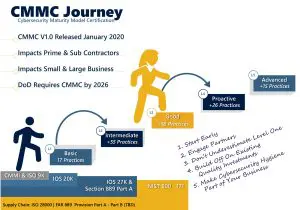In the evolving landscape of defense contracting, cybersecurity stands as a bastion of operational integrity and national security. The advent of the Cybersecurity Maturity Model Certification (CMMC) by the Department of Defense (DoD) has marked a significant shift towards standardizing and elevating cybersecurity practices among defense contractors. Amidst this transition, several myths surrounding cybersecurity have surfaced, clouding the understanding and implementation of effective security measures. This blog aims to demystify these misconceptions, shedding light on the realities of cybersecurity within the context of CMMC.
Myth 1: Compliance Equals Security
A common misconception is that compliance with regulatory standards, such as CMMC, equates to absolute security. While CMMC requirements are designed to enhance cybersecurity postures, compliance alone does not guarantee immunity from cyber threats. Cybersecurity is a dynamic field, with threats evolving at a rapid pace. Compliance frameworks like CMMC provide a foundational baseline, but organizations must adopt a proactive approach to security, continually assessing and updating their practices to counteract emerging threats.
Moreover, cybersecurity is not a one-size-fits-all solution. Each organization faces unique threats based on its operations, data sensitivity, and technological infrastructure. Therefore, while CMMC compliance is essential for defense contractors, it should be viewed as a starting point rather than the pinnacle of cybersecurity.
Myth 2: Small Businesses Are Not Targets
Another pervasive myth is that small businesses, due to their size and perceived lower profile, are not likely targets for cyberattacks. This assumption is dangerously misleading. In reality, small businesses, including smaller defense contractors, are often seen as attractive targets by cyber adversaries. Their defenses may be less robust than those of larger entities, making them more susceptible to breaches. Additionally, small businesses may serve as entry points or backdoors into the larger supply chain, including more significant defense contractors and the DoD itself.
Recognizing the potential vulnerabilities and the critical role small businesses play in the defense supply chain, CMMC places an emphasis on inclusive cybersecurity standards that apply to organizations of all sizes. This ensures that small businesses implement appropriate cybersecurity measures, protecting not only their assets but also the integrity of the larger defense ecosystem.
Myth 3: Cybersecurity Is Solely an IT Concern
Often, cybersecurity is mistakenly regarded as a responsibility that falls exclusively within the purview of the IT department. This narrow view overlooks the fact that effective cybersecurity is a multidisciplinary effort that encompasses various aspects of an organization. Human error, for instance, remains one of the leading causes of security breaches. Thus, fostering a culture of cybersecurity awareness across all departments and levels of personnel is crucial.
CMMC assessments and consulting emphasize the importance of a holistic approach to cybersecurity, integrating practices and protocols across the organizational spectrum. From regular employee training on cybersecurity best practices to executive-level engagement in cybersecurity planning, a unified approach ensures a more resilient defense against cyber threats.
CMMC
Cybersecurity, especially in the context of CMMC and the defense contracting sector, is fraught with myths that can hinder the effective implementation and understanding of necessary security measures. By debunking these myths, organizations can adopt a more informed and proactive stance toward cybersecurity. Compliance with CMMC requirements, while crucial, is just the beginning of a continuous journey toward cybersecurity excellence. Organizations must remain vigilant, adaptive, and inclusive in their cybersecurity efforts, ensuring the protection of Controlled Unclassified Information and, by extension, national security










